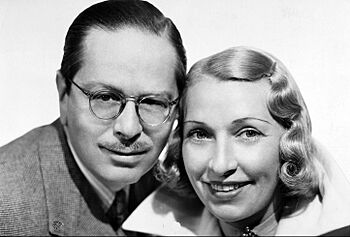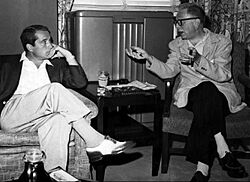Goodman Ace facts for kids
Quick facts for kids
Goodman Ace
|
|
|---|---|

Goodman and Jane Ace, 1938.
|
|
| Born |
Goodman Aiskowitz
January 15, 1899 Kansas City, Missouri, U.S.
|
| Died | March 25, 1982 (aged 83) New York City, U.S.
|
| Spouse(s) | Jane Epstein |
| Career | |
| Show | Ace Goes To the Movies Easy Aces (radio and television) Mr. Ace and Jane Monitor Weekday You Are There Jane Ace, Disk Jockey (writer) The Danny Kaye Show (writer) The Milton Berle Show (writer) The Texaco Star Theater (writer) The Big Show (writer) The Texaco Star Theater (television writer) The Perry Como Show< (television writer) Perry Como's Kraft Music Hall (television writer) |
| Station(s) | KMBC WPAT |
| Network | CBS NBC DuMont National Public Radio |
Goodman Ace (born Goodman Aiskowitz on January 15, 1899 – March 25, 1982) was an American humorist, writer, and comedian. He worked in radio, television, and as a magazine columnist.
Goodman Ace was one of the most popular writers in radio and television from the 1930s to the 1960s.
Contents
Early Life and Writing Dreams
Goodman Ace was born in Kansas City, Missouri. His parents were immigrants from Latvia. From a young age, Goodman wanted to be a writer. In high school, he was the editor of the school newspaper. He even used his first pen name, Asa Goodman.
While studying journalism at Kansas City Polytechnic Institute, he worked as a messenger. He also wrote a weekly column for the school newspaper. After his father passed away, he worked at the post office and a clothing store to help his family. Later, he became a reporter and columnist for a newspaper in Kansas City.
Goodman met his future wife, Jane Epstein, in high school. Their first date was at a sold-out concert. Six months later, in 1922, they got married.
Radio Adventures Begin
In 1930, Goodman Ace started a second job at radio station KMBC. He read the Sunday comics on air and hosted a Friday night show about movies. He wasn't excited about the job at first. His newspaper editor thought reading comics on the radio would help sell more papers. No one else wanted the extra $10 a week, so Goodman was told to do it. He then suggested the movie show for another $10.
One night, a show scheduled after Goodman's program didn't play. To fill the time, Goodman started chatting with his wife, Jane, who was with him at the station. They talked about a bridge game they had played. Goodman's clever humor and Jane's funny way of mixing up words (called malaprops) made listeners laugh. People loved their unplanned chat so much that KMBC gave them their own regular show.
The Easy Aces Show
This new show became known as Easy Aces. At first, it was about their bridge games. But soon, it changed to focus on Jane's funny situations and her famous malaprops. Goodman Ace wrote the show. He played a busy real estate salesman and Jane's loving but often confused husband. Jane would say things like, "You've got to take the bitter with the better" or "Time wounds all heels."
Easy Aces ran for a long time, from 1930 to 1945. It was known for its smart, natural conversations and Jane's funny mistakes. The show was never a huge hit, but people in the radio business loved it. It was seen as a show for intelligent listeners. Easy Aces even made it to the big screen in 1934. Goodman and Jane starred in short comedies playing their radio characters. While writing Easy Aces, Goodman also wrote for other radio shows.
During World War II, Goodman helped choose music for songbooks given to soldiers. He was part of a group of writers and performers called the "Committee of 25."
Writing for Other Stars
In 1945, Goodman Ace became a writer for The Danny Kaye Show. He had filled in for Danny Kaye before when Kaye was entertaining troops overseas. Goodman had a unique way of judging his scripts. He would count how many cigars he smoked while writing. One cigar meant the script was great, but four cigars meant it was probably not very good.
In 1948, Goodman tried to bring Easy Aces back as a longer radio show, but it didn't last. It also didn't do well on television. In 1956, there was talk of a new TV pilot for Easy Aces with other actors, but it's not known if it was made.
Goodman and Jane returned to radio on NBC's Monitor and Weekday shows. Goodman also started writing commercials that featured himself and Jane.
Television Work and You Are There
Goodman Ace wasn't always a fan of television. In 1953, he joked that "TV" stood for "Terrible Vaudeville." However, he did try his hand at it.
In 1949, Goodman and Jane adapted Easy Aces for television. It was a 15-minute show that aired on the DuMont network. Just like on radio, Goodman was witty, and Jane was charming with her malaprops. But the TV show didn't attract a large audience. After it ended in 1950, Jane mostly retired from performing. Goodman also stopped performing and focused on writing for others.
Goodman Ace also had a serious side. He used it to create a radio show called CBS Was There. This show took listeners back to historical events, described by real CBS News reporters. It later became famous on television with news anchor Walter Cronkite. The show's famous introduction was: "All things are as they were then, except you... are... there!"
Writing for Famous Performers
Goodman Ace became a writer for many famous performers, including Milton Berle, Perry Como, Danny Kaye, and Bob Newhart. He was nominated for Emmy Awards twice for his writing on The Perry Como Show. He once joked, "I'm not in television. I'm with Perry Como."
One of his best writing jobs was for The Big Show on NBC. This was a 90-minute variety show hosted by Tallulah Bankhead. It featured many great entertainers like Fred Allen, Groucho Marx, and Jimmy Durante. Goodman's clever writing style fit Bankhead's bold personality perfectly. He said his secret was to find out what guests loved, like Ginger Rogers' passion for golf, and write funny routines around it.
Goodman Ace had known comedian Jack Benny since his early days in Kansas City. As a young reporter, Goodman wrote a funny column that made Benny ask him for jokes for his stage act. Goodman even supplied Benny with jokes for free for years.
Goodman Ace wrote one movie script, I Married a Woman, in 1957. He called it the best thing he had ever written, but the worst thing he had ever seen after watching the movie. He never wrote another screenplay.
Goodman also helped teach young comedy writers at CBS in the 1960s. Many of them became successful television writers, and two became famous playwrights: George Axelrod and Neil Simon.
Later Years and Column Writing
In the early 1950s, Goodman Ace became a regular columnist for Saturday Review magazine. At first, he wrote funny criticisms of television. These were collected in a book called The Book of Little Knowledge.
Later, his column, "Top of My Head," covered broader topics. These essays were very popular. They were often gentle but sometimes sharp, always without real meanness. He often wrote about his beloved wife, Jane. Two collections of these essays were published: The Fine Art of Hypochondria and The Better of Goodman Ace.
In 1970, Goodman published a book called Ladies and Gentlemen – Easy Aces. It included eight complete Easy Aces radio scripts with new essays. He also had a regular spot on a New York radio station and later on National Public Radio in the 1970s.
Around that time, some of the original Easy Aces radio scripts were used for a Canadian TV show called The Trouble with Tracy. Although 130 episodes were made, the show was considered a creative disaster. This was mostly due to its very low budget and lack of rehearsal time. Goodman Ace did not appear in or produce this show.
Jane Ace passed away in 1974 after a long illness, just before what would have been their 50th wedding anniversary. Goodman wrote a touching tribute to her in Saturday Review, which received many letters from readers and old radio fans.
Death and Legacy
Goodman Ace died eight years after his wife, in March 1982, at their home in New York City. They are buried together in Mount Carmel Cemetery in Raytown, near their hometown of Kansas City.
The New York Times wrote that Goodman Ace liked to joke about TV ratings. He believed that a comedy show needed a good time slot and teamwork to succeed. He said, "The whole thing has to be a kind of partnership—a marriage between writer and performer."
Goodman Ace was known for his quick wit. Once, when a relative asked for $10,000 or they would jump from the fourteenth floor, Goodman reportedly wired back, "Jump from seven—I'll send $5,000."
When CBS let him go from his "comedy workshop" in the late 1940s, a sympathetic executive told him, "I'll tell you a secret—we haven't got a man who understands comedy." Goodman wryly replied, "I'll tell you a secret—that's no secret."
Goodman Ace even joked about his own legacy. When asked to nominate someone for a Hall of Fame, he suggested himself, adding, "If he isn't, I wouldn't dig him up just for this." Despite his humor, Easy Aces was inducted into the National Radio Hall of Fame in 1990.
Images for kids
 | Audre Lorde |
 | John Berry Meachum |
 | Ferdinand Lee Barnett |



